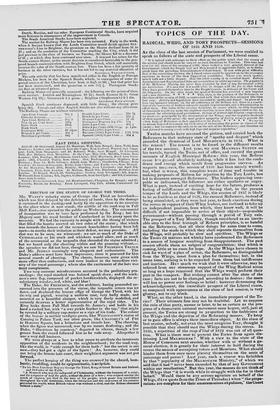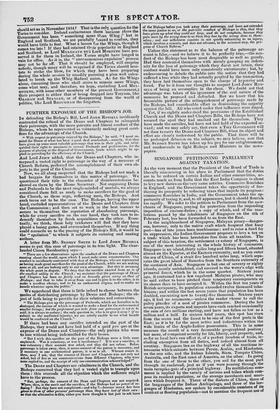TOPICS OF THE DAY.
RADICAL, WHIG, AND TORY PROSPECTS—SESSIONS OF 1835 AND 1836.
AT the close of the last session of Parliament, we were enabled to speak as follows of the state and prospects of the Liberal cause.
- It is indeed with reference to their effect on the public mind, thud the events of the session just closed most be viewed as most disastrous to Toryism. This time last year [at the close of the session of 1.834) there lurked a very general distrust of the Government, w hich the People had not then learned to appreciate fairly, or to distin- guish from the preceding Administration of Earl Gary. It was with great diMeulty that al the succeeding election the Liberal voters could he spurred on to the necessary exertions in fasour of the then Oppositlon Candidates. flit-re was much apathy, mixed with not a little disgust. Now the whole country is in exeellent heart. Reform A ssociat ions and Hee i stratiou Clubs are es ery w here in act ire operation. The popularity of the Melbourne Ministry has never been exceeded by that if any Gorernment
one recollection. It is seen that it is worth white to struggle with the Pe in their behalf.
They have proved themselves true to the People's cause, in defiance of the Court and the Oligarchy. On Ow other hand, the spit it of Reform has receivisl a new ifIlp11160 DIA a new direction. • • • • • This. then. is the position of the Reformers at the close or the session of 1833, as contrasted with that w hich they occupied this time last year, activity and hopefulness hare succeeded to apathy and disgust. In place of a lazy and ignorant reliance on the alt-sutliciency of the Reform Act, there is a convic- tion of the necessity of farther extensive organic improvementsond it determination to effect them. The tattle of the elective franchise, to secure which. in I834, hundreds of thousands would lust make the slightest exerti tttt is now duly fippreciated as the • strantent for olitaining good government. Instead of distrust and disunion—engendered, me must say. prineipally by the ndsconduet of the Whigs. and t he impolitic insolence of their organs or the press—the most perfi:rt sympathy of feelirg seems to pervade the whole body of Reliwmers is their opposition to the Tories. • • • • • We are by no means IliSIMIS.1 tO C1)1711-111i the fatal error of underrating the power or vigour of the enemy ; but we conceive the odds to be on the side of the Reformers ; and therefore we
look forward to coming events with high hope and sanguine expectation."
Twelve months have reversed the picture, and carried back the Reformers to that unhappy state of " apathy and disgust" which preceded the dismissal of Lord MELBOURNE in 1834. What is tie: reason? The reason is to be found in the different results of the two sessions. Last year, we sent MANNERS SUTTON on his travels, turned the Tories out of office, and carried the great measure of English Municipal Reform : this year, the Reform cause his gained absolutely nothing, while it has lost the confi- dence and energy which result from progressive success. As respects measures, the session of 1836 has been merely wasted; but, what is worse, this complete waste of time and trouble in making proposals of Reform for rejection by the Tory Lords, has led to disunion amongst Reformers. The leaders appearing inca- pable or indisposed, the followers are either apathetic or angry. What is past, instead of exciting hope for the future, produces a feeling of indifference or despair. Seeing that, in the present temper of the Lords and the Whigs, the session of 1837 is likely to be as fruitless as that of 1836, the earnest Reformers, instead of being stimulated, as they were last year, to fresh exertions during the recess in snpport of their Whig leaders, are inclined to take up an independent position, from which, they know well, it will be difficult if not impossible to arrive at their object—responsible government—without passing through a period of Tory rule. The prospect of a Tory Ministry, though considered as an inevit- able step to the final triumph of Reform principles, is so hateful to the Reformers, that all their doings for some time to come, including the mode in which they shall separate themselves from the Whigs, will probably be slow and spiritless. The Whigs or the Tories (it matters not which) have condenmed the Reformers to a season of languor resulting from disappointment. The past session affords them no subject of congratulation; that which is coming, little or no room for hope. As the Whigs have chosen to sink for want of a plan of action, the Reformers, as distinguished from the Whigs, must form a plan for themselves; but, in the mean time, nothing is to be expected from them but indifference and inaction. Hex much we wish that it were otherwise, may be inferred from our strenuous support of the Whig Radical union so long as a hope remained that the Whigs would perform their part in the compact. But wishing cannot alter the state of the case; facts are not to be changed according to desires: the mere will has no power over feelings or belief : however distressing the acknowledgement, the immediate prospect of the Liberal cause, as compared with appearances at the close of last session, is very gloomy, not to say black. What, on the other hand, is the immediate prospect of the To- ries? Their ultimate fate may not be doubtful. Let us suppose the ruin of that party, sooner or later, to be as certain as the pro- gress of a democratic national movement once begun, still, just at present, the Tories are strong in proportion to the feebleness of the Whigs and the dejection of the Reforming masses. To keep or to gain office is always their immediate object. At the close of last session, nobody, not even the most sanguine Tory, thought it possible that they should oust the Whigs during the recess. In 1835, a repetition of the coup d'elat of 1834 was out of all ques- tion. What is there now to prevent the Tories from again dis- missing Lord MELBOURNE? With a view to the state of the House of Commons next session, whether with or without a ge- neral election, it is greatly for their interest to hold during the recess the means of corrupting voters and Members. What should hinder them from once more placing themselves on the seats of patronage and power? Last year, such a course was forbidden by that" popularity of the MELBOURNE Ministry," of which we said that it had" never been exceeded by that of any Government within our recollection." But this year, the masses do not thinkaf the Whigs that " it is worth while to struggle with the foe in their behalf." Would there be any serious agitation on behalf of the Whigs, if (we quote from the Times of Thursda)) when" the prepa- rations are complete for their unceremonious expulsion," the Court should act as in November 1834? That is the only question for the Tories to consider. Ireland embarrasses them 'because there the Government has been " something more than Whig ;" but in England and Scotland, we are painfully hound to confess, they would have little to fear. What a lesson for the Whigs. though it comes too late ! If they had retained thssir popularity in England and Scotland, as Lord MULGRAVE awl Lord MORPETH have pre- served it for them in Ireland, the Tories might have longed in 'vain for office. As it is, the " uncesremonious expulsion" process may not be far off. That it should be employed, will surprise nobody, though many will be surprised if the Tories should hesi- tate to strike the blow, for which they have been preparing during the whole session by steadily pursuing a plan well calcu- lated to break up the Whig-Radical union. As for the Whigs alone, (meaning those who shall strive to remain mere Whigs, come what may, and therefore, we hope, excluding Lord MEL- BOURNE, with some other members of the present Government,) their prospect is either that of being dragged into Toryism, like GRAHAM and STANLEY, or of disappearing from the world of politics, like Lord BROUGHAM the forgotten.



























 Previous page
Previous page